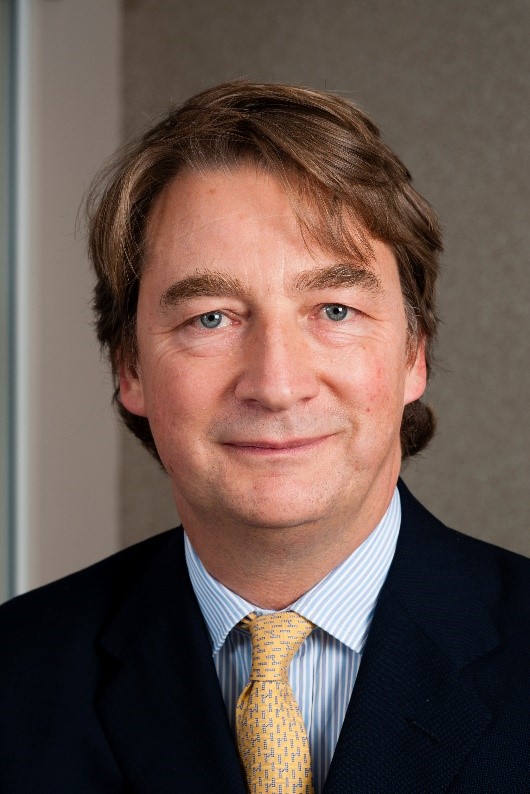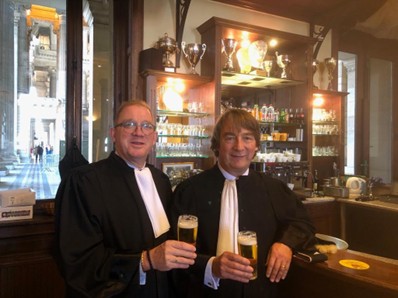
A glance at James’s early career path shows him to belong to the true aristocracy of European legal world:
A scholar reading law at Brasenose College, Oxford; a Middle Temple Bristow scholarship to the Court of Justice in Luxembourg; a stage in the European Commission’s Legal Service; a pupilage with Christopher (now Lord) Bellamy at Monckton Chambers; appointment as a legal secretary (or référendaire) to the then Advocate General Sir Gordon Slynn at the European Court; and a partner at Linklaters’ Brussels office.
An auspicious beginning if ever there was one!
At some point along that glittering path James fell within the gravitational pull of the arch Euro talent spotter, the late, great David Vaughan QC, who in 1996 recruited this brilliant young lawyer to Brick Court Chambers where he had gathered a group of barristers who practised more or less exclusively in matters relating to what was then known as European Economic Community (EEC) law. James slotted seamlessly into this group and became an invaluable members of the Euros. With his fluent French and network of friends and professional contacts across Europe, James made the Bar seem less parochial – indeed, fun. One member of Brick Court remembers that, on his arrival, James ‘brought Brussels glamour and immediately started transforming his room on the top floor of Devereux Court with his customarily elegant furniture and pictures’.
Quite how big a star James was destined to become, and how quickly this would happen, he himself would probably not have predicted, given his innate modesty. His rise was meteoric: after no more than six years as a successful junior, he took silk. And he flourished in that role for over 20 years, right up to the time of his untimely death last October, when he was very much at the peak of his success.
It would take hours to do justice to James’s stellar career at Brick Court, such was the depth and extent of his practice. From the outset he seemed to specialise in groundbreaking cases; the list of his clients reads like a who’s who of the leading national and multi-national companies.
So, all one can do is refer to a sample.
One of the benefits of James’s cosmopolitan legal training and experience was that he was equally at home in the English courts and in the Luxembourg tribunals. In the fairly early days at Brick Court, he was instructed in the famous Courage v Crehan litigation, both in the House of Lords and in the Court of Justice. He and David Vaughan were acting for a pub landlord in a landmark case about the validity of beer ties and the scope of the right to damages for breach of the competition rules. In the course of his cross-examination of a pub customer James was seeking to elicit that the reason the witness might frequent a particular pub was due to the variety of the beers on offer there. The cross-examination went as follows:
James: So how do you like to spend your evenings at the pub?
Customer: Well I generally start by fast forwarding 12 pints and then might have a whiskey.
James: How would you choose what pub to go to?
Customer: It would depend on the occasion; if I was taking a girlfriend I’d like a pub with a nice bit of carpet.
Most of those in court, including James, collapsed in giggles.
Despite its lighter moments that case was significant not just because it was the first UK standalone damages case to go to trial, but also because the Court of Justice clarified for the first time that one party to a contract which infringed a directly effective provision of the EEC Treaty could in certain circumstances rely upon that infringement to seek damages against the other party.
Another first in which James appeared was Insurance Brokers v DGFT – the first ever case before the newly formed Competition Appeal Tribunal.
And he was instructed in the first contested criminal cartel trial in the UK, relating to airline passenger fuel surcharge.
Then there was 2Travel v Cardiff Bus, in which the CAT made the first ever follow-on award of damages for breach of the competition rules in the UK.
Among his many notable appearances in the ECJ, James notched up a significant victory for the European Commission against FIFA and UEFAin a case relating to the UK rules on free-to-air sports broadcasting. Other Luxembourg hearings included the ICI/Soda Ash litigation, and the Akzo Nobel case where the Court of Justice established that in-house counsel do not have legal professional privilege in a cartel investigation. He also appeared in Microsoft’s appeal against the European Commission’s finding that it had abused its dominant position, with the imposition of record fines. More recently he represented Cathay Pacific in appeals against the retaken air cargo decision, and he appeared pro bono for Client Earthin an appeal concerning the right for NGOs to request a review of decisions of EU bodies in the environmental sphere.
In the course of his career, he gained a reputation for undertaking complex cases involving the interplay of the competition rules and intellectual property. His expertise in FRAND litigation relating to the licensing of standard essential patents was second to none, and in this connection he appeared for both Qualcomm and Samsung. More recently, he had been a frequent participant in the burgeoning collective actions before the CAT, following the relatively recent extension of its jurisdiction to entertain both opt-in and opt-out collective claims for breaches of the competition rules. Here he led the team which achieved certification for the Road Haulage Association in the Truckslitigation, the very first opt-in collective. And he sought damages for Brazilian orange farmers who had suffered loss as a result of the orange juice cartel in Brazil.
He was a major player in the well-known Paroxetine litigation – the UK‘s first ‘pay for delay’ case, and incidentally this country’s final preliminary reference to the European Court of Justice.
One of the most lengthy, complex and intractable cases which he undertook was the Pay TV litigation in the CAT. James represented Sky in its challenge to Ofcom’s decision requiring Sky to offer elements of its premium sports service to its competitors. Sir Gerald Barling, who chaired the Tribunal in his capacity as CAT President, recalls being able to see at close quarters and at leisure, just how able an advocate he was. His style of advocacy was understated, succinct and entirely non-abrasive. He was never anything but scrupulously courteous to all concerned, including his opponents. But despite this gentlemanly exterior, he took no prisoners. His legal analysis was faultless and his cross examination polite but robust and to the point. He did not waste time on superfluous waffle. His courtroom demeanour was beautifully summed up by a member of his chambers as a ‘combination of sweetness of manner and utter steel when required’. This understated, unflappable, gentle and quietly confident style was one of the secrets of his success. Both clients and judges found it immensely reassuring. No lesser person than the current Master of the Rolls, Sir Geoffrey Vos, once commended James for the ‘charming and gentlemanly way he presented his arguments’.
In 2011 his achievement was marked by his being named EU and Competition Law Silk of the year at the Chambers Bar Awards. Other similar acknowledgments of success followed.
Beyond the courtroom James participated in many other activities touching the law. He was an active Bencher of Middle Temple, and a kind and ever-willing mentor to all his colleagues in chambers, and in particular to those who were starting out. For many years, with his good friend Erik Pijnacker Hordijk, he judged an annual European law mooting competition which took him to some of the furthest flung reaches of Europe. Brexit did not deter him, although his choice of the Flemish-speaking Brussels Bar in 2019 showed a certain pragmatism in choosing the most Anglophile of the Belgian Bars.
Master Randolph and Master Flynn
However, James was so much more than just a fine lawyer and advocate. He was kind, civilised, erudite, unpompous and in every way a gentleman. He was an accomplished musician with a beautiful voice, a generous supporter of the Temple Music Foundation from the moment it started in 2002 until his death, of the Orchestra of the Age of Enlightenment and, closer to home, of the Lewes Chamber Music Festival; a published poet; a lover of good food, wine, literature and opera – he could be relied upon to give insightful reviews of almost any Glyndebourne production. In short, very much a renaissance man with a rounded and delightful personality, and the gift of making lasting friendships. The outpourings of admiration and love from members of his chambers and so many other friends and colleagues which followed the news of his death are a vivid testament to these qualities. All of us who knew him feel a great loss.
Adapted from tribute by Sir Gerald Barling at Master James Flynn’s memorial service – Thursday 13 March 2025


